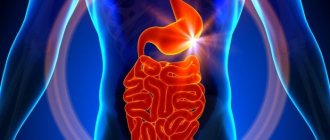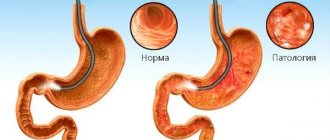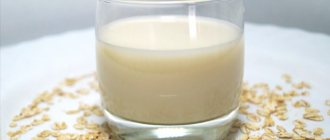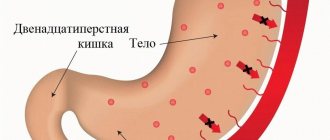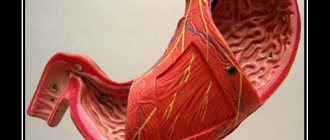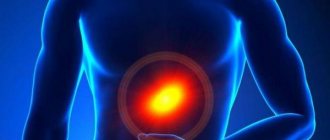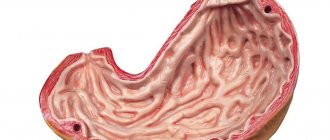Types of diffuse gastritis
According to the principle of development, diffuse gastritis has several types:
- Surface;
- Chronic;
- Subatropical;
- Antral.
Superficial gastritis is the mildest form of the disease. The mucous membrane retains its ability to repair itself, and all violations of its integrity are reversible. The source of inflammation makes up no more than thirty percent of the entire area of the mucosa. However, such a disease passes without any symptoms and is usually detected during research into other health problems. But, nevertheless, this type of disease must be taken seriously, since superficial gastritis left unattended can lead to irreversible processes.
Chronic gastritis is when the acute form of the disease turns into a sluggish process. In this case, the epithelium of the stomach is more deeply disrupted, which entails pain such as heaviness after eating, nausea, and acute pain. There is an excessive release of hydrochloric acid, which causes pain in the stomach, nausea, which turns into vomiting. Gastritis of this type can begin structural changes in the gastric mucosa, which will lead to irreversible consequences.
Subatropical gastritis is a severe form of the disease. Mucosal cells have irreversible pathological changes leading to their death. The affected areas of the epithelium stop producing gastric juice and are instead covered with connective tissue.
Antral gastritis (type B gastritis). With this type, a huge amount of hydrochloric acid is produced, which corrodes the tissue between the epithelium and the intestines. This type of gastritis is a consequence of untimely treatment of previous types. Antral gastritis usually affects most of the mucosa, and digestive activity is significantly reduced.
Diffuse gastritis has several varieties:
- Acute diffuse superficial gastritis;
- Diffuse superficial antral gastritis;
- Diffuse catarrhal gastritis.
How does gastritis manifest?
At the initial stage of the disease, there are no pronounced symptoms; inflammation can only be seen visually during fibrogastroscopy. Gradually, deeper layers of the mucous membrane are involved in the pathological process and digestion in the stomach slows down, which leads to various kinds of disorders.
The following signs indicate the development of diffuse chronic gastritis:
- pain that gradually becomes longer and more intense. Soreness occurs after eating fatty, fried or spicy foods;
- nausea. After vomiting, relief is noted, however, the symptom soon reappears;
- weight loss. Since the stomach tissues atrophy, the absorption function of the organ is disrupted and the patient does not receive enough nutrients.
In the subatrophic form of gastritis, the clinical picture is more pronounced:
- severe heartburn appears, which is difficult to eliminate even with medications;
- often after eating there is a sour belch;
- discomfort and pain are felt in the epigastric region;
- against the background of impaired digestion, increased gas formation;
- diarrhea or constipation often occurs;
- vision deteriorates;
- dizziness, sweating, and increased fatigue are noted.
Causes
Diffuse gastritis does not appear out of nowhere. There are several main reasons for its occurrence:
- Reflux. Due to the weakening of the muscles of the upper part of the stomach, which are responsible for the operation of the antral valve, food and bile are refluxed from the stomach into the esophagus or into other parts of the gastrointestinal tract. So, gastritis of various types may begin.
- Bacteria Helicobacter pylori. Scientists have proven that the cause of gastritis is the pathogenic bacteria Helicobacter pylori. Most people have this pathogen. But as soon as the colonies of bacteria grow, they attack the gastric mucosa and cause gastritis. The impetus can be an incorrect diet.
- Stress. Nervous psychological stress affects the functioning of absolutely all vital organs. Emotional stress combined with poor nutrition can lead to disruption of digestive processes.
- Eating the “wrong” food. Excessive consumption of fried foods, foods with high or low temperatures, carbonated drinks. On the other hand, lack of liquid food, eating on the go, in a hurry, when food is not chewed enough, can lead to diffuse gastritis.
- Glitch in the daily routine. Due to a certain work schedule, when you have to work in shifts during the day or at night, the biological clock is disrupted, which entails the occurrence of gastritis.
- Uncontrolled use of nonsteroidal drugs. Often, a patient suffering from problems of the musculoskeletal system “prescribes” himself non-steroidal anti-inflammatory medications, not knowing about the rules for taking them. Namely, the main components of these drugs have a strong effect on the gastric mucosa.
- Drinking alcohol or smoking, especially on an empty stomach. Alcohol causes increased secretion of hydrochloric acid, but since the stomach is empty, self-destruction of the gastric epithelium occurs.
- Carrying out surgery in the stomach or intestines.
Causes of the occurrence and development of the disease
The causes of diffuse gastritis can be many factors; usually the disease develops due to their combination. The main factor of the disease is non-compliance with the correct diet or poor quality food. That is why schoolchildren and working people are most susceptible to the disease, whose daily routine often does not allow them to eat healthy food. Various processed and instant foods, fast foods, fatty and fried foods, as well as copious amounts of food additives negatively affect the health of the stomach, putting it at risk of disease.
In addition to poor quality nutrition, gastritis can also be caused by an incorrect daily routine or sleep disturbance. Lack of rest or working at night will negatively affect the health of the body, and a large amount of stress and tension will also have a bad effect on the state of the nervous and digestive systems.
Having bad habits also puts you at risk of developing the disease. A long history of smoking, alcohol abuse, or even taking medications on an empty stomach prevent the regeneration of mucosal tissue, which, together with an already acquired disease, only aggravates the situation.
Symptoms of the disease
Diffuse gastritis does not appear out of nowhere; it develops gradually. And at first it is absolutely asymptomatic. As the disease develops, the gastric mucosa is increasingly affected, and the functioning of the gastrointestinal tract is disrupted.
The first symptoms are pain in the stomach, especially in the upper part. These pains intensify immediately after eating. In the future, nausea may be added, and the duration of stomach pain may increase in time and intensity. Due to impaired secretion of gastric juice, the production of hydrochloric acid is significantly reduced. Its volume is not enough to digest food, and therefore attacks of nausea occur.

A constant inflammatory process disrupts the functioning of the gastrointestinal tract, while food is poorly digested, nutrients are not absorbed, but are excreted from the body. And as a result – loss of body weight. In this case, unstable bowel function is observed, in which diarrhea is replaced by constipation.
The severe form of diffuse gastritis is accompanied by constant heartburn, increased gas formation, belching, fatigue and frequent dizziness.
Along with the main symptoms of the disease, secondary ones may also be observed, such as increased salivation and secretion of sweat glands, loss of strength, and drowsiness. All this is accompanied by neurological symptoms, namely, the patient is haunted by the feeling of crawling goosebumps, he experiences a slight tingling of the skin and numbness of the limbs.
So, the main symptoms of diffuse gastritis:
- Pain and heaviness in the upper part of the stomach, accompanied by heartburn, belching;
- Nausea and vomiting in combination with dizziness and weakness as a result of intoxication of the body;
- Lack of appetite;
- Loss of body weight;
- Anemia;
- Paleness and dryness of the skin;
- Brittle nails and increased hair loss.
Complications
In the presence of factors favorable for inflammation, gastritis passes from an acute form to a chronic one, and then to a subatrophic one. In the absence of adequate and timely therapy, the disease can cause the development of the following diseases:
- reflux gastritis. Due to increased acidity, the work of the pylorus is disrupted, which does not allow the contents of the stomach to enter the overlying section of the digestive tract. When hydrochloric acid is thrown into the esophagus, the mucous membrane of the esophageal tube becomes covered with ulcers and erosions, and the organ itself may begin to gradually shrink and prevent food from penetrating into the stomach;
- peptic ulcer. Due to necrosis of the gastric mucosa, erosion forms on the surface of the epithelium, which does not differ in appearance from the surrounding tissue, and its bottom is covered with fibrin. If unfavorable factors continue to influence for three days, then the erosion transforms into an ulcer, that is, the inflammation spreads beyond the muscular plate of the mucosa. If you start therapy within two weeks, the ulcer will heal, otherwise the disease will become chronic;
- malignant tumor. The degeneration of cells of the gastric mucosa can begin both against the background of chronic gastritis and against the background of peptic ulcer disease. In the first stage of cancer there are no symptoms. Pain, heaviness in the abdomen, nausea, vomiting, loss of appetite appear when the tumor is already blocking the pylorus of the stomach. Another feature of stomach cancer is that it quickly metastasizes and affects the pancreas, lungs, liver, small intestine, and lymph nodes.
Treatment
Like most diseases, the effectiveness of treatment depends on early therapy. Diffuse gastritis at the initial stage is easily treatable and completely curable. More advanced forms require more serious and long-term therapy with various agents.
Treatment methods for diffuse gastritis include:
- Taking medications;
- The use of folk remedies;
- Following a special diet.
Whatever method is chosen, adherence to the diet is mandatory.
Preventive actions
To prevent stomach disease, it is recommended to give up bad habits, start leading an active lifestyle, and monitor your diet. Regular medical examination and visits to a gastroenterologist will help avoid complications of the inflammatory process.
Inflammation of the stomach is a common disease. Gastritis is characterized by the same symptomatic signs. To treat the diffuse form, you should follow a therapeutic course: the use of medications, adherence to dietary nutrition. A healthy lifestyle, playing sports, giving up bad habits is the key to health.
The information on our website is provided by qualified doctors and is for informational purposes only. Don't self-medicate! Be sure to consult a specialist!
Author: Rumyantsev V. G. Experience 34 years.
Gastroenterologist, professor, doctor of medical sciences. Prescribes diagnostics and carries out treatment. Expert of the group for the study of inflammatory diseases. Author of more than 300 scientific papers.
source
Basic rules of diet for diffuse gastritis
- The daily nutritional intake should be divided into 5-6 meals. At the same time, fractional meals should be varied;
- Prohibition on eating fatty and fried foods. It is better to steam the dishes or bake them in the oven. Do not use spices or add too much salt;
- The consumption of rich foods, sweets, and chocolate is prohibited;
- For drinks, preference is given to weak tea, and it is better to prepare decoctions or infusions of herbs and dried fruits. It is worth giving up sweet carbonated drinks, strong coffee, alcohol;
- The basis of any diet should be fermented milk products with a small mass fraction of fat;
- The first courses are prepared in secondary meat or vegetable broth;
- For dessert, baked apples, stewed pumpkin, and dried fruits are used.
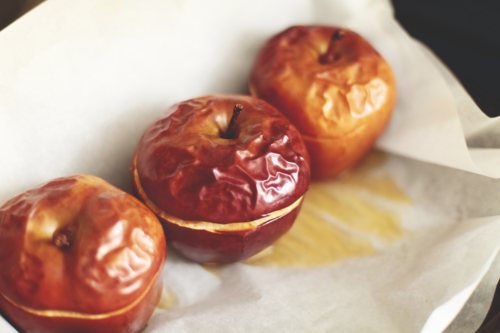
Therapy
If a diffuse form of gastritis occurs, the patient needs to visit a gastroenterologist. The examination will help make an accurate diagnosis; based on the research data, medical history and patient complaints, the doctor will prescribe appropriate therapy. The patient is required to follow directions. If you have any questions, it is recommended to consult your doctor. Self-medication brings little results, sometimes causing irreparable damage to health.
The success of therapy for diffuse gastritis is largely determined by identifying the cause of the disease and immediately contacting a gastroenterologist.
At first, the patient will have to limit his food intake; only tea and mineral water are allowed among drinks. Further, during therapy, it is necessary to exclude certain foods from the usual diet.
Medications
The fight against diffuse gastritis goes through several stages:
- Therapy aimed at suppressing the bacteria Helicobacter pylori.
- Treatment of the gastric mucosa for the purpose of restoration and protection.
- Revitalizing the functioning of the stomach.
- Relieves pain and relaxes the smooth muscles of the stomach.
- Restoring the body's protective functions.
To destroy Helicobacter pylori bacteria, traditional broad-spectrum antibiotics are used, such as Azithromycin, Clarithromycin, Tetracycline, Levofloxacin. The drug De-Nol has recently become very popular. Its action is aimed at destroying pathogenic bacteria. To improve the condition, proton pump inhibitors Omeprazole or Omez are prescribed.
Antacid medications take care of the restoration of the gastric mucosa, and are also aimed at protecting against various irritating factors. As a rule, these are Almagel, Gaviscon, Rennie, Gastal. Dissolving in the stomach, they envelop the mucous membrane, relieving inflammation and protecting from damage.
No-shpa, Spazgan, Spazmalgon relieve spasms and pain well.
The functions of the stomach are restored by enzyme preparations. Pancreatin, Festal, Mezim, Panzinorm help in the process of digesting food, thereby preventing a feeling of heaviness and pain.
The use of vitamin complexes of groups B, A, E, C is very useful in the treatment of diffuse gastritis.
The course of treatment for diffuse gastritis is quite long. During this period, immune suppression occurs. To restore it, immunostimulating drugs Imudon, Viferon, Eleutherococcus, Isoprinosine are prescribed.
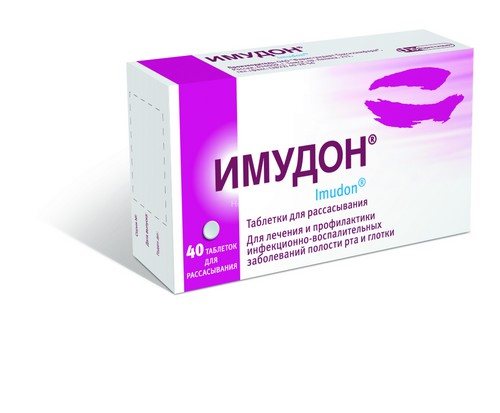
It is important to remember that taking medications for the treatment of gastritis can only be started after consultation with a gastroenterologist.
Often, specialists prescribe physiotherapy as an additional remedy. Physical procedures help improve blood circulation in the stomach and restore smooth muscle motility. UHF, paraffin, Electrophoresis, nitrogen and pine baths are best suited for this.
Folk remedies
Treatment of diffuse gastritis with conservative methods will be more effective if traditional medicine is added to them. There are many recipes that promote rapid restoration of affected areas of the gastric mucosa. But even traditional medicine should be used only after consultation with your doctor.
Most recipes for the treatment of gastritis include plants such as chamomile, aloe, and plantain. Mint, licorice, flax, linden, etc. Based on them, decoctions, infusions, and teas are prepared. Here are some recipes.
The following are well suited for healing inflamed areas:
- Freshly prepared cabbage juice. You need to drink 100-150 ml every morning on an empty stomach;
- Porridge of one grated apple with honey half an hour before breakfast;
- Ground blueberries with sugar in the amount of one teaspoon. It should be eaten three times a day before meals.
Diffuse gastritis can be either high or low acidity. One tablespoon per 250 ml of boiling water can help treat both types. The decoction should be drunk three times before meals. After eating, it would be good to eat one teaspoon of blue cyanosis roots, crushed to flour. As a result of taking this remedy, pain goes away, spasms are relieved, wounds on the walls of the stomach heal, becoming covered with a thin film of cyanosis.
Freshly prepared potato juice can help treat gastritis with high acidity. Raw juice in a volume of 100 ml is taken twice a day thirty minutes before meals. Pink-skinned potatoes work best for this recipe.
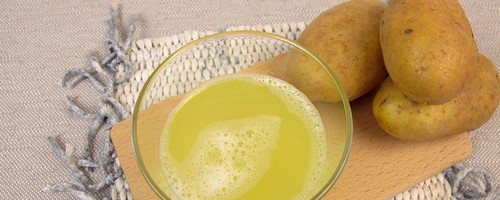
For low acidity, aloe juice mixed with honey in a one to one ratio is suitable. Like potato juice, aloe is taken thirty minutes before meals. For the recipe, you need to take a plant three to four years old. The leaves are cut off, wrapped in black paper and placed in the refrigerator for 2 weeks.
To treat erosive gastritis, medical alcohol is used. Take 250 ml per course. Alcohol is taken according to the following scheme. In the morning, on an empty stomach, you need to eat one tablespoon of butter, then take two teaspoons of alcohol, and then drink 2 raw eggs. When the alcohol runs out, gastritis will be curable.
Flax seed is often used to treat gastritis. Pour 1 tablespoon of seeds without top over night with one glass of boiling water, stir after a few minutes and leave to infuse until the morning. Take thirty minutes before breakfast on an empty stomach. Course – 30 days. Then take a month's break. The number of courses is three or four.
Herbal mixtures help well in the treatment of diffuse gastritis. Some herbal decoctions have anti-inflammatory and antibacterial effects, they help relieve pain, prevent nausea and heartburn.
The herbal mixture is prepared from one teaspoon of mint and calamus root, two tablespoons of St. John's wort and plantain, one third of a spoon of cumin seeds. Pour two tablespoons of this mixture into one glass of hot water and leave to infuse for 12 hours. Take 30 ml infusion before each meal. Continue the course of treatment until heartburn stops completely.
The universal collection consists of such herbal ingredients as sea buckthorn oil, calendula flowers, nettle leaves, shepherd's purse, yarrow, bedstraw. This collection is aimed at healing the gastric mucosa.
Herbs for reduced secretion of gastric juice - St. John's wort (3 parts), plantain, immortelle, wormwood, calendula (all herbs one part).
Herbs for high acidity - calamus root, yarrow, mint, nettle, chamomile (in equal parts).
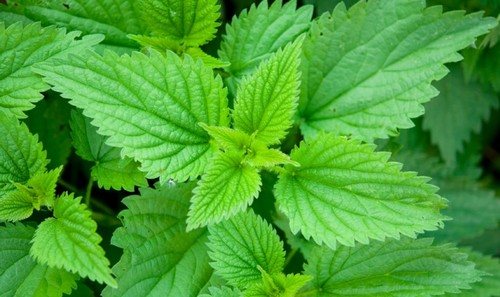
Decoctions from these collections are prepared according to the same scheme. Brew one tablespoon of any mixture with one glass of boiling water and place the container in a water bath for 15 minutes. Drink one third of a glass 30 minutes before meals.
Prevention
Prevention of gastritis lies in proper nutrition. Any therapeutic diet is aimed at preventing irritation of the gastric mucosa. The daily diet should be divided into five to six equal portions. The breaks between meals should be short to avoid feeling hungry. All dishes must be warm; on the other hand, spicy dishes, fatty foods, all kinds of smoked foods, alcoholic drinks, chocolate, and buns are prohibited.
The basis of the diet for the prevention of gastritis should be vegetable broths, porridge with water, boiled lean meat or fish, kefir, compote, jelly. A double boiler or multicooker will be a good help for preparing dietary dishes.


